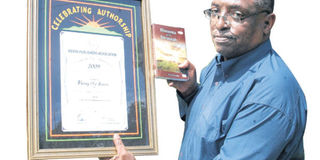Want to write a bestseller? Think in your first language

Author Henry Kulet shows his winning-award novel title: Blossoms of the Savannah. Writing an award winning creative work in a language rather than that of your own is not easy. PHOTO| FILE| NATION MEDAI GROUP
What you need to know:
- It has eluded for long some of the finest creative writers of our times, however hard they have tried to write such works
- The common denominator is a well structured and constructed story
- I can assure you it is not any easy putting English words into a mouth that has never spoken them
- However, winning Jomo Kenyatta Prize for Literature twice is no mean feat. It is a great achievement that I believe every creative writer should aspire to win
Theoretically, it should be possible for any creative writer with a narrative ability to devise a formula which would produce an award winning novel whenever the formula is activated.
The proof that no such formula exists is evidenced by the fact that the winning of such awards all over the world has never been easy.
It has eluded for long some of the finest creative writers of our times, however hard they have tried to write such works.
The same applies even on our local scene. No such formula exists, and I doubt one will ever be devised in the foreseeable future.
THE SECRET
So when in 2009 my novel, Blossoms of the Savannah (2008), won the Jomo Kenyatta Prize for Literature and scooped second position in the 2010 Wahome Mutahi Literary Award, and then in 2013, another of my works, Vanishing Herds (2013), won yet again the Jomo Kenyatta Prize for Literature, a few curious readers asked me how I managed such a feat.
One could easily be tempted to attribute such a feat to sheer luck. I would, however, like to disabuse such a notion. No luck is ever involved in creative work.
I have, however, discovered one common denominator in all award winning novels, and which appeals to judges of such works.
The common denominator is a well structured and constructed story.
Writing a possible bestseller is not easy. Perhaps one meaningful way of answering the curious readers who would like to know what it takes to write a novel that would catch the eye of a literary judge is to pinpoint the serious challenges that confront such a writer.
To best answer this question, I have to state the challenges that always confront me when I begin to write.
IN MOTHER-TONGUE
First and foremost is language. If I had a choice, I would have preferred to write in a language in which I believe I can express my ideas most effectively. My mother tongue, Maa, would be my language of choice.
Inevitably, however, I write in the English language. This is because of overwhelming social and economic reasons, and especially for the reason that English is the commercial as well as the instructional language in our institutions of learning.
I therefore have had no choice but to use it as best as I can to achieve my literary goals.
However, even as I struggle to write in English, I still think in Maa and my research is done in it. My readers could, therefore, view my novels as first written in Maa before being translated into English.
And, because a lot of the original work is lost through translation, I believe my award-winning novels and indeed all the other 10 novels I have written would have been best understood had they come out in their original language.
My readers would note that most of my creative work is set in rural areas and the characters that I invent are mostly simple pastoralists.
ENVIRONMENTAL FACTORS
They live simple lives that are mostly dictated by natural atmospheric happenings that shape the environment. Consequently, the language of such characters is shaped by the environment they live in.
Even their culture is borne and developed within the confines of their environment.
A challenge of nearly insurmountable degree that often faces me comes when I attempt to address my readers, not in my own voice, but in the voice of my created characters, which often means speaking in several different voices and tones.
I can assure you it is not any easy putting English words into a mouth that has never spoken them. And it is not easy interpreting their swear-words, their sighs, the clicking of their tongues and sometimes describing a whistle-sound that means so much to them.
So what you read in English is not necessarily what I would have wanted to mean. Some of the expressions are watered down during the translation, others are lost while others become mute.
IN MAA LANGUAGE
Even gestures, although they may be described to the finest detail, when explained in the mother tongue, there are words, that explicitly say what they mean, which are not easy to interpret into another language.
What this means is that language is not only expressed in words. There are other non-linguistic behaviours and attributes that include gestures, body language and even meaningful expressionlessness.
What I am alluding to herein above is that, according to me, writing an award winning creative work in a language rather than that of your own is not easy.
Hypothetically, had I written Blossoms of the Savannah and Vanishing Herds in Maa, and the judges understood the language perfectly, possibly the accolades that I have earned would have been stronger.
However, winning Jomo Kenyatta Prize for Literature twice is no mean feat. It is a great achievement that I believe every creative writer should aspire to win.




